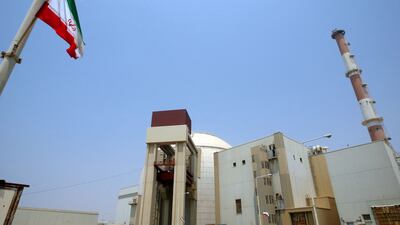The window of opportunity for Iran and world major powers to reach a nuclear deal may be closing as both sides dodge blame.
The International Atomic Energy Agency's board of governors has officially rebuked Tehran for undeclared materials at its controversial sites.
The row has escalated in recent months, with the Vienna talks reaching a dead end after one year of on-and-off meetings in the Austrian capital, as the UN agency says the accounts given by Iranian officials seem to lack credibility.
On Thursday, the head of the UN nuclear watchdog said Iran has removed “basically all” extra monitoring equipment installed under the 2015 nuclear deal.
There are clear signs of deep mistrust, says Brian Katulis, a senior fellow and vice president of policy at the Middle East Institute.
“The message that the IAEA has sent so far has reinforced ongoing and growing concerns about Iran's nuclear programme and the lack of confidence that the Iranian government has been honest and transparent about all of its nuclear activities,” Mr Katulis told The National.
“These concerns show that the Iranian government continues to take steps that reduce overall trust in the role that it plays on regional and global security, in addition to the long record Iran has in taking destabilising actions that undermine security in key parts of the Middle East.”
The argument has become worse over the past six months, culminating on Wednesday in an announcement by Tehran that it would install sophisticated centrifuges at its underground sites to boost its uranium-enrichment activities, which are a short step from a weapons-grade level.
Iran has turned off some cameras monitoring its nuclear-related work in violation of the 2015 deal it struck with world powers.
Tehran informed the IAEA by letter that it plans to disconnect 20 IAEA surveillance cameras and other monitoring equipment, the agency's chief Rafael Grossi told its board on Thursday, according to diplomats at the meeting.
It comes hard on the heels of a resolution passed overwhelmingly by the agency’s board of 35 governors, in which they rebuked Tehran for not fully co-operating with its inspectors for the past three years. Only Russia and China opposed the resolution while India, Pakistan and Libya abstained.
“Iran condemns the adoption of the resolution presented by the United States, Britain, France and Germany at the Board of Governors meeting of the International Atomic Energy Agency as a political, unconstructive and incorrect action,” the Iranian foreign ministry said on Thursday in a statement.
The ministry said other steps could follow without giving details.
The US was swift in welcoming the latest resolution.
“Iran’s insufficient co-operation requires us all to act,” said US Ambassador to the IAEA Laura Holgate.
‘Alternative policy approaches with Iran’
Last month, US special envoy for Iran Robert Malley told Congress that the prospects of reviving the Iran nuclear deal were bleak, with the odds for failure outweighing those for success.
In 2018, the US withdrew from the nuclear deal that lifted most international sanctions on Iran in return for strict limits on its nuclear activities. The former administration of Donald Trump also reimposed sweeping economic sanctions on the country.
Iran has repeatedly accused the UN nuclear watchdog of relying too much on “fabricated” Israeli intelligence reports.
In its response to Wednesday’s resolution, Israel said it predicts a UN Security Council intervention in the future.
“This is a significant resolution that exposes Iran's true face,” Prime Minister Naftali Bennett said in a statement.
“If Iran continues with its activities, major countries should bring the Iranian issue back to the Security Council.”
Experts say that the IAEA's voicing of strong concerns at this point also indicates that the diplomatic efforts to engage the Iranian government may not produce the desired results.
“The Biden administration along with key regional and global partners need to start thinking more clearly about alternative policy approaches,” said Mr Katulis, who has appeared regularly at key congressional committees to provide expert testimony.
The window of reaching a deal is not utterly closed, however, as Iran, the US and the European negotiators tend to add intensifiers and caveats in their official tweets and press briefing that they are willing still to go the extra mile to avoid a full-blown regional conflagration.
Before Wednesday’s resolution, the co-ordinator of the Vienna talks, the EU's top diplomat Josep Borrell, warned in a tweet at the weekend that the possibility of returning to the accord was “shrinking”.
“But we still can do it with an extra effort,” he said, on his official Twitter account.










